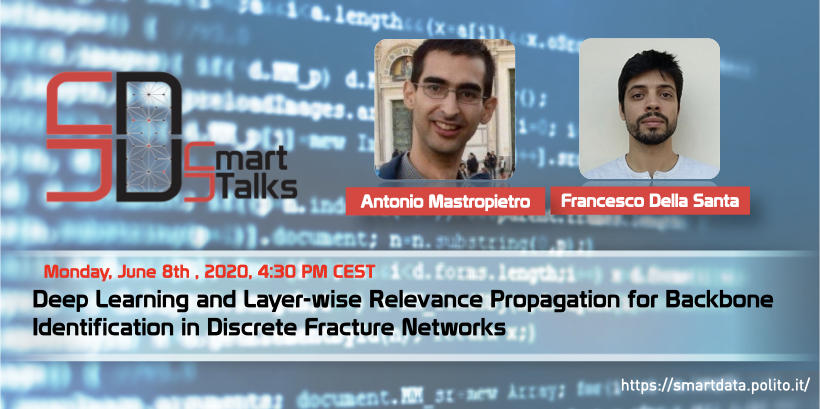
Presenters: Antonio Mastropietro & Francesco Della Santa
Monday, May 8th, 2020 16:30
Location: Microsoft Teams – click here to join
Antonio Mastropietro: Layer-Wise Relevance Propagation for Deep Learning Surrogate Model investigation
Nowadays engineering applications involve the use of computationally heavy simulations to solve dynamical systems that model a given physical phenomenon. By training a surrogate model of the dynamical system with data- driven algorithms, one can obtain approximate predictions of the desired phenomenon, while considerably reducing the simulation time. This talk will introduce the method of Layer-Wise Relevance Propagation, belonging to the class of XAI (eXplainable AI) for deep learning algorithms, and will discuss its application to surrogate models of physical phenomena coming from engineering.
Biography Graduated in Mathematical Engineering at PoliTO, Antonio Mastropietro is now a PhD student in Pure and Applied Mathematics at Politecnico di Torino and collaborates with Addfor s.p.a.. His research focuses on Deep Reinforcement Learning and Deep Learning applied to computer vision.
Francesco Della Santa: Backbone Identification in Discrete Fracture Networks through Deep Learning and Layer-wise Relevance Propagation
Discrete Fracture Networks (DFN) are models used to accurately simulate the flow in underground fractured media, a problem arising in many engineering and industrial applications, such as oil and gas extraction, water resources preservation and pollutant diffusion analysis. Unfortunately, in general, only a statistical distribution of the position, orientation and size of all fractures is available. Thus, due to the probabilistic nature of DFNs, uncertainty quantification (UQ) is a fundamental issue in the framework of flow and transport characterization in a real fractured medium. UQ analysis typically requires thousands of DFN generations and simulations, which makes the application of Neural Networks (NNs) desirable in order to perform flux regression tasks and speed up the whole procedure. In this presentation, focusing on the framework of DFN with fixed geometry and random transmissivities, we introduce a novel method for the identification of a backbone of the network. The method is based on the application of the Layer-wise Relevance Propagation (LRP) algorithm to Multitask NNs trained for flux regression of DFNs.
Biography Master graduate in Mathematics at University of Florence in 2017, Francesco Della Santa is now a PhD student in Pure and Applied Mathematics at Politecnico di Torino. His main research topic is data-driven machine learning methods for physically-based simulations.
